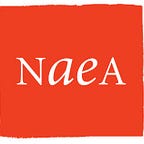Viewfinder Issue 4 -- Intentionality and the Role of the Museum Educator: Letter from the Editors
Sara Egan, Emily Jennings, and Chelsea Emelie Kelly, Viewfinder Editorial Board
Many art museum educators are engaging with the field of social justice, profoundly changing institutional understandings of equity and broadening audience engagement. How is this achieved and maintained? Through intentionality — reflection, mindfulness, constant learning and collaboration.
This week, museum educators from across the country and around the globe will gather in New York City for the annual NAEA Museum Education Division Preconference, with the theme Diversity & Inclusion: Art Museum Educators as Levers of Change, and the National Convention on The Challenge of Change that follows. Through listening, reflecting, and discussion, we will solidify our resolve to continue empowering our visitors and colleagues to use our galleries and collections to question structures of power and to appreciate the diverse strengths and perspectives of our communities. As we return home, we’ll want to share what we’ve learned and the new approaches we’re considering. But with so many ideas swimming in our heads and the stakes so high, how do we process all we’ve heard and thought? How do we enact real change at our museums?
The articles included here offer frameworks to apply these learnings to affect change in ourselves and in our institutions. Authors Anne Kindseth, Carolyn Armbruster, and Amelia M. Kraehe remind us that the first and most important shift is in our ourselves. They describe how they, as educators committed to being more intentional in how they teach about race, led a museum-wide initiative towards compassion and social justice. Randi Korn’s Cycle of Intentional Practice is a model that can be adapted by any individual or museum to ensure that we are being responsible to our missions and our communities.
These authors all describe challenging journeys towards change that are sparked by a need or desire to adopt a new way of thinking, that acknowledge failure and cognitive dissonance, and that result in developing a new way of working. They also speak to the importance of identifying the communities to which we each belong, and considering our relationship to the communities represented by and marketed to by our museums. We encourage you to articulate your own process of intentional practice, your way of staying true to yourself and your values. As we learn and work together with openness, curiosity, and intention, we can leverage our skills as educators to create a more equitable, compassionate world.
See you in New York!
— The Viewfinder Editorial Board
Sara Egan
Sara Egan (Twitter) connects Boston students and teachers with the Isabella Stewart Gardner Museum as manager of the School Partnership Program and the Teens Behind the Scenes. She holds a BA from Vassar College and an Ed.M. from the Harvard Graduate School of Education, and is an adjunct professor of art at Simmons College.
Emily Jennings
Emily Jennings oversees both Teacher and School Programs at the Fine Arts Museums of San Francisco. Her duties include in-gallery teaching, developing facilitated programming, organizing teacher education programs, and producing curriculum. Her work in curriculum development is shaped by a commitment to researching how museums function as learning environments where students use and understand the metacognitive structures that shape specific disciplines. She holds an MA in Art History from San Francisco State University and a M. Ed. in Historical Thinking from the University of British Columbia, Vancouver.
Chelsea Emelie Kelly
Chelsea Emelie Kelly (Twitter) is an art museum educator specializing in gallery teaching and museum technology. She is currently Youth Corps Coordinator at Park Avenue Armory and holds a MS.Ed. in leadership in museum education from the Bank Street College Graduate School of Education and a B.A. in art history from Vassar College.
